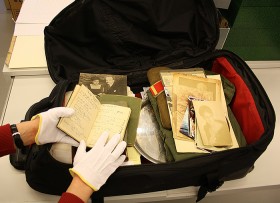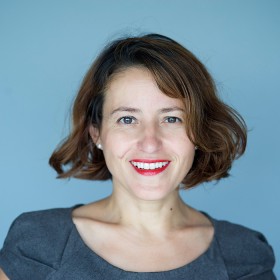The Last Signs of a Life in Germany Sold at Auction 75 Years Ago

Franziska Bogdanov, unpacking the suitcase from Arno Roland’s bequest
Jewish Museum Berlin CC-BY Katharina Erbe
The items in our archives have arrived here through the most various means: we have donations from German-Jewish emigrants from all over the world as well as gifts from their estates, donated to the museum after they have died by their children. We also receive some gifts from Germany, occasionally from people who aren’t themselves Jewish and yet some memorabilia from a Jewish friend or acquaintance was passed down through the generations in their family.
At the end of this last year we received a donation from the estate of a one-time Berliner who recently died in New Jersey (USA). It consisted of a large suitcase filled to the brim with documents, letters, photographs, and other objects. → continue reading
The “Daughters and Sons of Gastarbeiters” (guest workers) are the Academy of the Jewish Museum Berlin’s guest on 14 October 2015, part of the “New German Stories” series. As children, these Berlin authors followed their parents to Germany from their home villages in Anatolia, southern Europe and the Balkans, or they were born into working-class neighborhoods around Germany. Their mothers and fathers were supposed to bolster the German economic recovery as mere “guest workers”. The authors tell their personal stories, look back, follow their parents’ paths and thus add to Germany’s culture of memory. In advance of the event, we’ve asked three questions of Çiçek Bacık, the project’s leader and co-initiator:

Çiçek Bacık © Neda Navaee
Ms. Bacık, how did the “Daughters and Sons of Gastarbeiters” come to be and what was the motivation to tell these personal stories?
Last year, I went to a reading with my friend, the journalist Ferda Ataman. We were sitting in a bar afterwards. “Ferda, we have to start telling our stories and share them with others. We ourselves have to shed light on a dark chapter of our past we’ve successfully repressed,” I said. “Sure, and what’s stopping us?” That was the starting point for “Daughters and Sons of Gastarbeiters”. Our first reading took place in January 2015 at the Wasserturm in Kreuzberg. → continue reading
The Many Faces of Isaac and Ismael, Part 3
Everyday, hundreds of video clips get produced at our video box that is part of the exhibition “Obedience. An Installation in 15 Rooms by Saskia Boddeke & Peter Greenaway.” This month, we have been particularly taken by the multitude of languages spoken by our visitors who present themselves as Isaac or Ismael:
Lisa Albrecht, responsible for compiling the clips, is since able to introduce herself in a number of languages.

